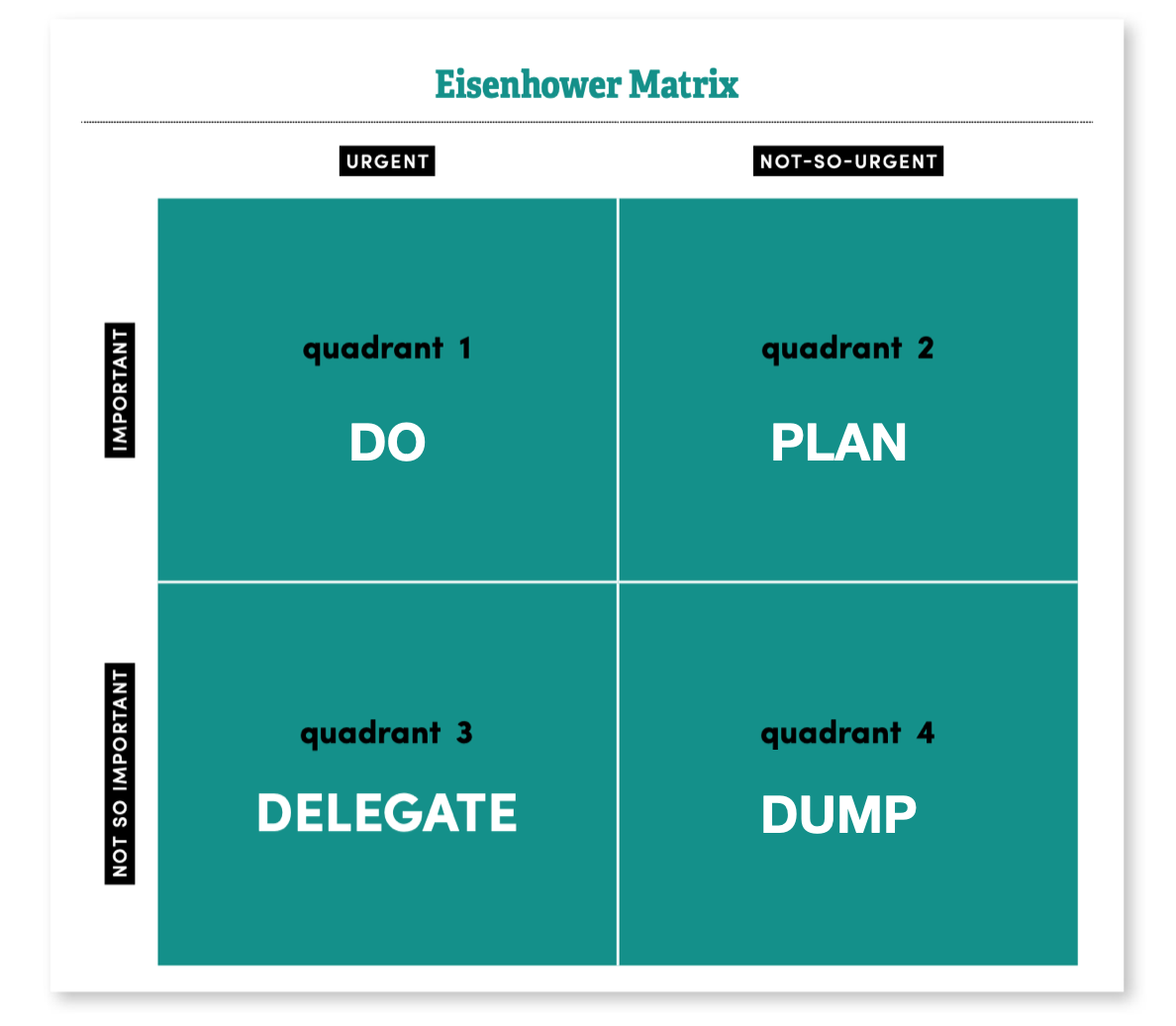5 time management tips for busy professionals
| Meeting skills, saying no, setting priorities, win time, dealines, setting goals, multitasking

Time Management is really about managing yourself. You can't really "manage" time, because there are exactly 24 hours in a day, 60 minutes in an hour, 60 seconds in a minute and that never changes. You can, however, determine to what and how long you spend time. And use this time as efficiently as possible. So you don't feel overwhelmed by your to-do list.
Here are the 5 best tips for becoming master of your own time.
TIP 1: Prevent procrastination with the Eisenhower matrix
Without clear priorities, chances are you'll spend the day putting out fires and tackling whatever seems most urgent.
Eisenhower's model is one of the most famous time management tools for setting priorities.
This tool takes its name from former U.S. President Dwight D. Eisenhower, who famously said, "Urgent matters are rarely important and important matters are rarely urgent.
The model helps you determine whether to postpone, delegate or perhaps dump a task. Here's how it works.
As you can see in the figure, there are four different quadrants. These indicate important and non-important things on the one hand and urgent and non-urgent taks on the other.

Quadrant 1: Important, Urgent - DO
This quadrant contains the tasks that require your immediate and undivided attention. Examples: dealing with an irate customer, meeting the deadline, a computer crash, urgent phone call ...
Quadrant 2: Important, Not urgent - PLAN
This quadrant involves activities that are important but not urgent. These are mainly the tasks that contribute to the achievement of your personal and professional goals. The second quadrant is very important and actually contains the things that are going to help you further in your career. Examples of tasks in the second quadrant are self management, launching new projects, tapping into new markets, investing in self development, expanding your network.... In the first quadrant you are mainly reactive, while in the second quadrant you act proactively.
Quadrant 3: Urgent, Not important - DELEGATE
This is where we find our main time predators. They require our immediate attention, but they are not actually that important. It is best to pass on or delegate these tasks to others. Examples of such activities are meetings you shouldn't attend, useless email traffic, unexpected visitors (internal or external), meeting the priorities of others ...
Quadrant 4: Not urgent, Not important - DUMP
Tasks in the fourth quadrant don't get you very far. If your day consists mainly of these kinds of activities, at the end of the day you feel like you've done a lot but achieved little. So, ditching them is the message. Some examples: surfing the Internet, daydreaming, excessive checking of e-mail, Whatsapping ...
The essence of Eisenhower's priority matrix is to divide your tasks as much as possible between the first and second quadrant. The second quadrant is particularly important because it contains the tasks that contribute to more quality and results.
Also watch this video on why it is so important to set priorities in your life.
TIP 2: Learn to say no.
While it's important to be a team player, it's also good to know when and how to set boundaries.
How often does it happen to you that you say "Yes" to others to avoid an unpleasant situation?
Both in the office and in our free time, we are very often confronted with all kinds of questions, invitations or unnecessary obligations, where we find it difficult to say "No". This often puts our own priorities on the back burner and consumes both time and energy. Give your general well-being a boost and say "No" more often, so you have space left for the things that are really important to you.
If you do agree to do something for someone else, negotiate a deadline that allows you to complete the task without compromising your own goals. A healthy dose of assertiveness can undoubtedly work wonders.
TIP 3: Increase your effectiveness with the 80/20 rule
The 80/20 rule states that the ratio of input to output of your work is rarely, if ever, balanced. For example, 20 percent of the products generate 80 percent of the sales. Applied to your job, it means that about 20 percent of your efforts produce 80 percent of the results. Learning to recognize that 20 percent and focus on it is the key to using your time most effectively.
Here are a few quick tips for applying the 80/20 rule.
- Take a good look at the people around you. Twenty percent of your colleagues, co-workers or team members are likely to give you 80 percent of the support and satisfaction you need. They are the source of your success. Take good care of them.
- Also take a critical look at your tasks and your work . Ask yourself, "What is most rewarding? What 20 percent of my work can I best focus on?"
It's a way to optimize your time allocation according to the tasks that bring you the most or get you the most to your goal.
TIP 4: Cut down on meetings
Poorly managed meetings are time-wasters, not only for yourself but also for the other participants. Make sure your presence at the meeting is useful and that you are not just meeting for the sake of meeting.
Here's what you can do for more productive meetings:
- Ask yourself: do I really need to attend for the full duration of the meeting? Often your presence in meetings is not necessary and thus a waste of time.
- Suggest that a colleague be present at the meeting and that they brief you afterwards.
- Ask the question whether a meeting is the best option. Perhaps it can be arranged via conference call or email.
- If you can, ask that the agenda items relevant to you be taken one after the other, which means you don't have to be present for the entire meeting.
When scheduling a meeting in your calendar, also provide time BEFORE and AFTER the meeting and avoid back-to-back meetings. After all, chances are that a meeting will run a little late and then you'll run into trouble - stress! - for your next appointment. You may also have some things to prepare before the meeting, and even afterwards you may need to look something up, jot down action points or forward information.
So block out at least an extra 15 minutes before and after the meeting.
TIP 5: Eliminate online time wasters
Occasionally checking your Facebook or sending a Whatsapp won't hurt. But these digital tools can be real disruptors. Is yours Instagram? Twitter? E-mail?
We spend a lot of time on social media every day: more than an hour on average per day. We sometimes feel obliged to "like" other people's posts, to respond to text messages or other notifications. This creates stress and often a feeling of guilt if we don't do it. A study by the University of Leuven shows that many young people would rather ignore the smartphone more often, 'if their friends would do the same'. So this peer pressure causes extra stress.
For example, I recently heard a friend say that he no longer found time to cook or exercise. Oddly enough, he takes at least one hour a day to read all the Facebook messages, whatsapps and tweets. Precious time he could have been using for other things....
Social media may feed you tasty treats all day long, but isn’t it time you went on a data-diet? It’s your choice!
A few tips for dealing with social media in a more conscious way:
- Set a time limit on posting or viewing content. In total, spend no more than half an hour a day viewing posts, photos, infographics, news and articles. This will save you 5 hours per work week.
- On average, we check our Facebook or other social media about 6 times a day. This is too much. Limit your social media use to one moment a day. For example, in the evening after dinner or during your lunch break. That way you avoid interrupting your work routine by checking your Facebook or Twitter every time.
- Are you active on various social media? Then use a tool to manage your different accounts simultaneously. These tools - such as Hootsuite or Social Sprout - can often be found online for free. Manage all your accounts at a glance and do so at a set time. Again, limit the time you spend on them, which will make for a more efficient and effective use of social media.
BONUS TIP: Take care of your health.
A good night's sleep, healthy eating and enough exercise will give you the energy, focus and stamina you need to make the most of your day. It may seem like work is more important and that you can always catch up on sleep, healthy eating and exercise later. But your health comes first. With full batteries, you can take on the whole world.
More information: Time Management Training







